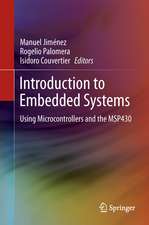Model-Based Design of Adaptive Embedded Systems: Embedded Systems, cartea 22
Editat de Twan Basten, Roelof Hamberg, Frans Reckers, Jacques Verrieten Limba Engleză Paperback – 8 feb 2015
| Toate formatele și edițiile | Preț | Express |
|---|---|---|
| Paperback (1) | 641.71 lei 43-57 zile | |
| Springer – 8 feb 2015 | 641.71 lei 43-57 zile | |
| Hardback (1) | 652.64 lei 43-57 zile | |
| Springer – 16 mar 2013 | 652.64 lei 43-57 zile |
Din seria Embedded Systems
- 20%
 Preț: 312.03 lei
Preț: 312.03 lei - 20%
 Preț: 411.16 lei
Preț: 411.16 lei - 18%
 Preț: 950.66 lei
Preț: 950.66 lei - 15%
 Preț: 634.68 lei
Preț: 634.68 lei - 23%
 Preț: 456.63 lei
Preț: 456.63 lei - 15%
 Preț: 646.11 lei
Preț: 646.11 lei - 15%
 Preț: 697.65 lei
Preț: 697.65 lei - 18%
 Preț: 946.55 lei
Preț: 946.55 lei - 20%
 Preț: 532.91 lei
Preț: 532.91 lei - 15%
 Preț: 693.06 lei
Preț: 693.06 lei - 18%
 Preț: 783.81 lei
Preț: 783.81 lei - 18%
 Preț: 784.79 lei
Preț: 784.79 lei - 32%
 Preț: 303.94 lei
Preț: 303.94 lei - 20%
 Preț: 700.08 lei
Preț: 700.08 lei - 15%
 Preț: 643.48 lei
Preț: 643.48 lei - 18%
 Preț: 789.35 lei
Preț: 789.35 lei - 15%
 Preț: 585.27 lei
Preț: 585.27 lei -
 Preț: 387.75 lei
Preț: 387.75 lei - 24%
 Preț: 786.96 lei
Preț: 786.96 lei - 18%
 Preț: 833.09 lei
Preț: 833.09 lei - 15%
 Preț: 648.24 lei
Preț: 648.24 lei - 33%
 Preț: 988.97 lei
Preț: 988.97 lei - 18%
 Preț: 943.73 lei
Preț: 943.73 lei -
 Preț: 447.89 lei
Preț: 447.89 lei - 15%
 Preț: 641.71 lei
Preț: 641.71 lei - 15%
 Preț: 643.34 lei
Preț: 643.34 lei - 15%
 Preț: 640.06 lei
Preț: 640.06 lei
Preț: 641.71 lei
Preț vechi: 754.95 lei
-15% Nou
Puncte Express: 963
Preț estimativ în valută:
122.83€ • 133.47$ • 103.24£
122.83€ • 133.47$ • 103.24£
Carte tipărită la comandă
Livrare economică 21 aprilie-05 mai
Preluare comenzi: 021 569.72.76
Specificații
ISBN-13: 9781489996190
ISBN-10: 1489996192
Pagini: 320
Ilustrații: XIV, 306 p.
Dimensiuni: 155 x 235 x 17 mm
Greutate: 0.45 kg
Ediția:2013
Editura: Springer
Colecția Springer
Seria Embedded Systems
Locul publicării:New York, NY, United States
ISBN-10: 1489996192
Pagini: 320
Ilustrații: XIV, 306 p.
Dimensiuni: 155 x 235 x 17 mm
Greutate: 0.45 kg
Ediția:2013
Editura: Springer
Colecția Springer
Seria Embedded Systems
Locul publicării:New York, NY, United States
Public țintă
ResearchCuprins
Adaptivity in Professional Printing Systems.- Aspects of Adaptive Systems Engineering: A Professional Printing Case.- Piezo Printhead Control: Jetting Any Drop at Any Time.- Adaptive Strategies for Productive Toner Printers.- Reasoning with Uncertainty about System Behaviour: Making Printing Systems Adaptive.- Supporting the Architecting Process of Adaptable Systems.- Model-Driven Design-Space Exploration for Software-Intensive Embedded Systems.- Engineering Embedded Software: Managing Complexity and Evolution.- Reflections on the Octopus Project.
Textul de pe ultima copertă
Today’s embedded systems have to operate in a wide variety of dynamically changing environmental circumstances. Adaptivity, the ability of a system to autonomously adapt itself, is a means to optimise a system’s behaviour to accommodate changes in its environment. It involves making in-product trade-offs between system qualities at system level. The main challenge in the development of adaptive systems is keeping control of the intrinsic complexity of such systems while working with multi-disciplinary teams to create different parts of the system.
Model-Based Development of Adaptive Embedded Systems focuses on the development of adaptive embedded systems both from an architectural and methodological point of view. It describes architectural solution patterns for adaptive systems and state-of-the-art model-based methods and techniques to support adaptive system development. In particular, the book describes the outcome of the Octopus project, a cooperation of a multi-disciplinary team of academic and industrial researchers. This industry-as-laboratory project has used the professional printing domain to validate the project results in an industrial context.
Model-Based Development of Adaptive Embedded Systems is targeted at both academic researchers and industrial practitioners. It provides state-of-the art surveys of important aspects of adaptive embedded systems, including system architecture, software architecture, system design, and control strategies. These topics are addressed from a systems engineering perspective by researchers from different disciplines including systems engineering, software engineering, control theory, computer science, and electrical engineering with a clear focus on the industrial validation of the research outcome.
Model-Based Development of Adaptive Embedded Systems focuses on the development of adaptive embedded systems both from an architectural and methodological point of view. It describes architectural solution patterns for adaptive systems and state-of-the-art model-based methods and techniques to support adaptive system development. In particular, the book describes the outcome of the Octopus project, a cooperation of a multi-disciplinary team of academic and industrial researchers. This industry-as-laboratory project has used the professional printing domain to validate the project results in an industrial context.
Model-Based Development of Adaptive Embedded Systems is targeted at both academic researchers and industrial practitioners. It provides state-of-the art surveys of important aspects of adaptive embedded systems, including system architecture, software architecture, system design, and control strategies. These topics are addressed from a systems engineering perspective by researchers from different disciplines including systems engineering, software engineering, control theory, computer science, and electrical engineering with a clear focus on the industrial validation of the research outcome.
Caracteristici
Discusses development of adaptive embedded systems both from an architectural and methodological point of view Includes state-of-the art information on system architecture, software architecture, system design, and adaptive control Demonstrates how system modeling can facilitate the development of adaptive embedded systems Validates methods described using real examples from industry




















